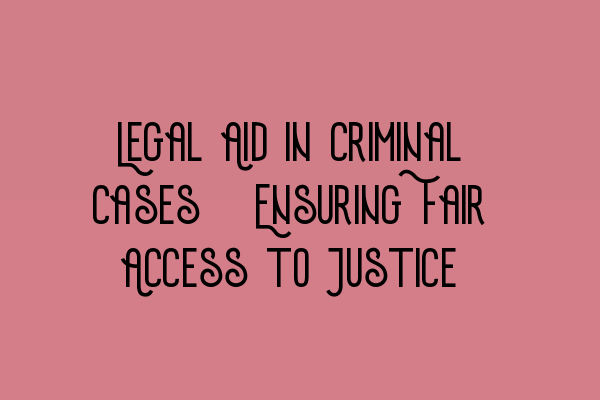Legal Aid in Criminal Cases: Ensuring Fair Access to Justice
In the criminal justice system, every individual is entitled to fair representation and access to justice.
However, not all individuals have the financial means to afford a private solicitor to defend themselves against
criminal charges. This is where legal aid becomes crucial in ensuring equal access to justice for all.
Legal aid provides assistance to individuals who cannot afford legal representation or access to legal advice.
It is an essential component of a fair and just legal system, as it prevents discrimination based on financial
status and ensures that everyone has a meaningful opportunity to present their case.
Criminal cases can be complex and require specialized knowledge and expertise. Without legal aid, individuals
facing criminal charges would be left to navigate the legal system alone, potentially resulting in unfair
outcomes and a lack of confidence in the justice system.
The Importance of Legal Aid
Legal aid plays a crucial role in upholding the principle of innocent until proven guilty, which is a
fundamental aspect of any fair criminal justice system. By providing access to legal representation, legal aid
ensures that individuals have the opportunity to challenge the evidence against them, present their own evidence,
and receive a fair trial.
Additionally, legal aid helps to address power imbalances between the state and the individual. The state often
has vast resources at its disposal, including expert witnesses and forensic specialists. Without legal aid, an
individual without financial means would struggle to contest the state’s case effectively. Legal aid levels the
playing field and ensures a fair fight in court.
Challenges and Controversies
Despite its importance, legal aid has faced several challenges and controversies in recent years. Budget cuts
and austerity measures have severely impacted the availability and quality of legal aid services. This has led to
longer waiting times, reduced access to legal aid in certain cases, and a strain on the already overburdened
criminal justice system.
The increasing complexity of criminal cases and the rising costs of legal services have also contributed to the
challenges faced by legal aid. As a result, some individuals may not meet the strict financial eligibility criteria
for legal aid, leaving them without support and potentially compromising their right to a fair trial.
Ensuring Fair Access to Justice
It is crucial for policymakers, legal professionals, and society as a whole to recognize the importance of legal
aid in criminal cases and take steps to ensure fair access to justice for all. This includes adequate funding for
legal aid services, reforming eligibility criteria to be more inclusive, and implementing measures to streamline
the legal aid process.
In addition, raising awareness about the availability and benefits of legal aid is essential. Many individuals
may not be aware that they qualify for legal aid or understand how to access it. Educating the public about their
rights and the support available to them can help bridge the access to justice gap.
To learn more about legal topics and the UK legal system, please check out our related articles:
Demystifying the Solicitors Qualifying Examination Format,
LLC Formation Made Simple: Step-by-Step Guide for UK Entrepreneurs,
LLC Formation: A Step-by-Step Guide for UK Entrepreneurs,
Business Regulations in the UK: A Comprehensive Overview,
and
Ethical Considerations in UK Law: Upholding Professional Standards.
